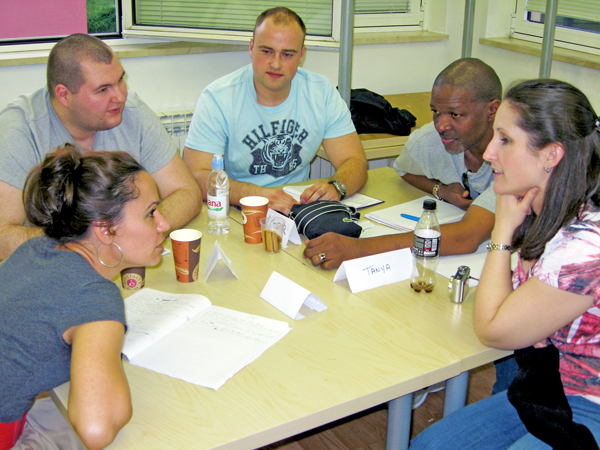By Dan Ebener
For The Catholic Messenger
(Editor’s Note: This is the fifth in a series of articles by Dan Ebener on leadership in the Catholic Church. They are excerpts from his latest book on leadership, to be published this fall.)

A group discusses leadership during a class in Zagreb, Croatia.
Leadership is a collective activity. It relies on people. Relationships are the stuff of leadership. A congregation is a web of relationships. To practice the people skills needed for leadership, ask yourself:
What kind of a human being do I need to become so that I can practice leadership?
As Catholics, we are committed to inner change. Jesus calls us to form our hearts out of his love (Luke 10:27). Ashes during Lent are but one example of how we acknowledge that we are committed to change our hearts, our minds and ourselves to become better human beings.
Research shows that we can become compassionate communicators by nurturing an inner silence, being fully present to the moment, adopting a more relaxed attitude, speaking briefly and listening deeply to others. For Catholics, this entails a rich spiritual life of prayer and reflection on Scripture. Prayer has a powerful effect on the one who prays. It transforms our hearts, our minds and our actions.
Leadership is an inside-out activity. It begins with work on the inside and moves toward the outside. The formation of the heart is our path to leadership and to holiness. The heart is the place where we can find the quiet of the soul, where we connect with God and where we develop the capacity to know, love and serve each other — heart to heart — before we can lead each other.
Neuroscientists teach that the key to happy, healthy, spiritually fulfilling lives is forming the connections between the heart and the brain. When we actively participate in the Mass, pray the rosary or spend prayerful time in eucharistic adoration, we strengthen the connections between our head and heart.
Scripture teaches us to form our hearts in love and then to listen to our carefully formed hearts, to be attentive to matters of the heart, to be conscious of what the heart is telling us and intentional about following the message that the Spirit moves into our heart.
Take the case of Mary Magdalen at the foot of the cross (John 9:25). All four Gospels name her as staying with Jesus throughout the crucifixion — even when all hope seemed gone. Matthew also describes her as “standing there in front of the tomb” (Matt 27:61). No wonder she is the first one to witness the resurrection (Matt 28; Mark 16; Luke 24; John 20).
Mary Magdalen’s ability to hope against all hope is a witness to the resilience critical to leadership. As parish leaders, we need to be aware of how powerful the heart is — and how the action of the heart can change the function of the brain. The heart nurtures empathy. This is counter-intuitive for the brain. Empathy is a choice made in the heart. It is the basis for heartful leadership.











